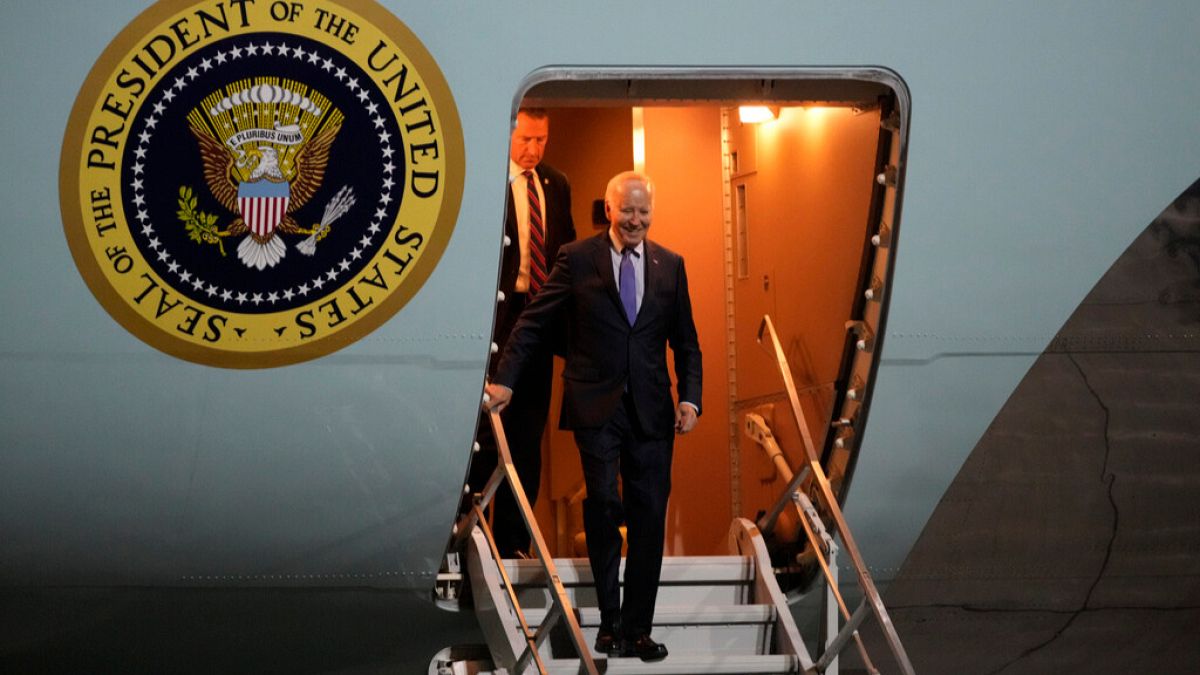German politicians are overall pessimistic about the prospect of Trump returning to the White House, remembering past clashes as they look to the future in supporting Ukraine.
US President Joe Biden landed in Berlin on Thursday evening for a brief visit to celebrate transatlantic solidarity and discuss how Western leaders can help support Ukraine against Russia.
His visit will be his last in office. With the US election weeks away, and the race extremely tight, the possibility of former president Donald Trump winning threatens to alter US foreign policy and the relationships Biden is in Berlin trying to maintain.
German Chancellor Olaf Scholz has made no secret of his admiration for Biden in improving relations between the countries since Trump was last in power. On Wednesday, he told parliament, “The American president stands for an incredible improvement in cooperation in recent years.”
Scholz and his government have either been muted or openly concerned about the idea of a second Trump term. Germany’s Foreign Minister Annalena Baerbock described it as “completely unclear” when asked following Biden’s disastrous debate performance against Trump in June.
At the G7 summit in Italy in June, Scholz openly said he would prefer Biden to win a second term over Trump.
Politicians from opposition parties have criticised the government for not being more prepared, with Christian Democratic Union (CDU) politician Jens Spahn saying that the government should try build contacts with Trump and his team.
“We should not make the same mistake as during his last presidency,” Spahn told local media.
CDU’s leader Friedrich Merz predicted in his party’s conference last week that if Trump was to be in power relations would be “quite unfriendly” although ultimately concluded in the end it would be, “the same for both.”
With little enthusiasm from politicians, the German public is also pessimistic about Trump returning to power. Over 80% of Germans think that a Trump presidency would have a negative impact on transatlantic relations, according to a survey carried out by the foundation, the Körber Stiftung.
Past relations
A negative perception of a Trump presidency could stem from memories of the last time Trump was in office, between 2016 and 2022.
During this time, he regularly clashed with then-Chancellor Angela Merkel. One iconic photograph of the pair, taken at the G7 summit in 2017, shows Trump sitting down, smirking as Merkel stares him down.
Merkel and Trump clashed over defence spending, migration, climate change and trade, with Merkel concluding after one G7 summit in Sicily in 2017 that “we Europeans really have to take our fates in our own hands.”
Near the end his presidency Trump ordered the Pentagon to withdraw over 12,000 American troops stationed in Germany over frustration with the German government refusing to spend more on defence.
Support for Ukraine in question?
Trump in office poses the greatest threat to Ukraine as it fends off Russian forces with the help of foreign aid. The US is by far the biggest supplier of Ukrainian military aid, with Germany the largest nation state in Europe, according to data from the Kiel Institute for the World Economy.
Trump’s withdrawal or reduction of support for Ukraine, which he has hinted is a possibility, could signal other European countries might be required to step up the gap.
The German government is split on how far it is willing to go to support Ukraine, with the Greens and the liberal Free Democratic Party pushing for further support.
Scholz has, however, repeatedly dragged his heels when it comes to key decisions regarding providing Ukraine with military support. He drew international criticism when he hesitated to send Ukraine Leopard 2 battle tanks at the start of the invasion and has repeatedly refused to send the country Taurus cruise missiles, which Ukraine has insisted are crucial to beating Russian forces.
The leader promised Zelenskyy during his recent trip to Berlin that Germany would continue to financially support the war-torn country. However, it seems increasingly unable to as it has struggled to fill gaps in its yearly budget—a crisis that almost ruptured the fragile ruling coalition.
In the 2025 draft budget, Germany stepped up its contributions to NATO but halved its funds to Ukraine.
Experts predict that if Trump gets into power, his additional reduction in support for NATO will mean European countries might have to step in to fill gaps left behind by the US and, therefore, decrease their support for Ukraine.

